![]()
Diversions:
Television & Literature
![]()
![]()
Diversions:
Television & Literature
![]()
Besides my general literary interests, I actually watch some TV when time permits. Ironically, TV has become somewhat of a luxury for me. Even though I don't usually find anything I like to watch with regularity, I do have a couple of favorite shows. The most recent of which are Seinfeld and Northern Exposure, which A&E currently carries. Below are some pictures from that show, a link to a great Northern Exposure Web site (click on the first picture below), and my generally useless analytical commentary on the individual characters.
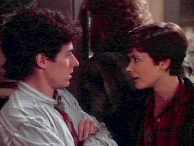 Here's
the main characters of Northern Exposure, Joel Fleischman and Maggie O'Connell,
engaged in what was to become one of the sustaining elements of Northern
Exposure: a typically hostile dialogue implicitly examining the nature
of heterosexual relationships while exuding a deep and primal sexual tension.
(In other words, they dug each other while at the same time were repulsed
by each other's "world views.") They eventually recognized their
problem and, working together, diagnosed their paradoxical love/hate relationship
with the phrase "mutually desirous incompatibles" if memory serves.
Here's
the main characters of Northern Exposure, Joel Fleischman and Maggie O'Connell,
engaged in what was to become one of the sustaining elements of Northern
Exposure: a typically hostile dialogue implicitly examining the nature
of heterosexual relationships while exuding a deep and primal sexual tension.
(In other words, they dug each other while at the same time were repulsed
by each other's "world views.") They eventually recognized their
problem and, working together, diagnosed their paradoxical love/hate relationship
with the phrase "mutually desirous incompatibles" if memory serves.
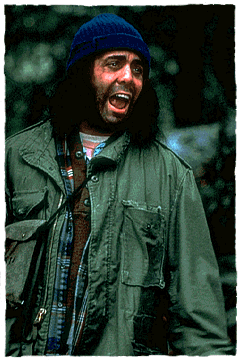 This is Adam
on the series; he plays a crotchety, cynical war veteran skilled in guerilla
combat tactics. Another element of his character is that he's also
a sensitive and genius gourmet chef. Don't ask me. That
mix seems to "work" on the screen. Incidentally, his wife's name
is Eve. But most people recognize him from the TV show Chicago
Hope. I don't know his character on that show, but I think his real
name is Adam Arkin.
This is Adam
on the series; he plays a crotchety, cynical war veteran skilled in guerilla
combat tactics. Another element of his character is that he's also
a sensitive and genius gourmet chef. Don't ask me. That
mix seems to "work" on the screen. Incidentally, his wife's name
is Eve. But most people recognize him from the TV show Chicago
Hope. I don't know his character on that show, but I think his real
name is Adam Arkin.
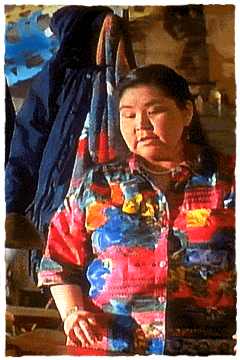 This is Marlyn
Whirlwind on the show. Her character's function seems to be calling
out Dr. Joel Fleischman on his egotistical, neurotic, urban, citified personality.
She acts like the "wise woman," or native consciousness, who holds all
the healing medicine. This seems to be why she is Dr. Fleischman's
secretary -- to make the contrast between conventional, drug-dependent,
"white" medicine and "nontraditional," native, spiritual medicine.
This is Marlyn
Whirlwind on the show. Her character's function seems to be calling
out Dr. Joel Fleischman on his egotistical, neurotic, urban, citified personality.
She acts like the "wise woman," or native consciousness, who holds all
the healing medicine. This seems to be why she is Dr. Fleischman's
secretary -- to make the contrast between conventional, drug-dependent,
"white" medicine and "nontraditional," native, spiritual medicine.
 I would be
remiss if I didn't mention Chris Stevens, a convicted felon who serves
as the town's philosophically gifted disk jokey for Cicely Alaska's radio
station KBHR. One of my favorite episodes is the one in which Chris
defends his Master's thesis by taking two ideologically opposed English
professors out to the baseball field in the dead of winter to re-enact
the folk poem "KC at Bat." Ultimately, Chris teaches them the essential
significance underlying the poem in such a way as to make both "professors"
speechless. This picture captures him deep in his frequent musings
over humanity's dichotomous nature or Albert Camus' existential meaning
in the essay "The Myth of Sisyphus."
I would be
remiss if I didn't mention Chris Stevens, a convicted felon who serves
as the town's philosophically gifted disk jokey for Cicely Alaska's radio
station KBHR. One of my favorite episodes is the one in which Chris
defends his Master's thesis by taking two ideologically opposed English
professors out to the baseball field in the dead of winter to re-enact
the folk poem "KC at Bat." Ultimately, Chris teaches them the essential
significance underlying the poem in such a way as to make both "professors"
speechless. This picture captures him deep in his frequent musings
over humanity's dichotomous nature or Albert Camus' existential meaning
in the essay "The Myth of Sisyphus."
![]()
Literature Links
![]()
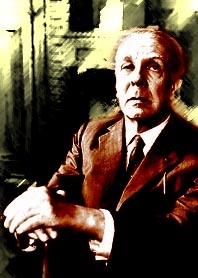
Jorge Luis Borges (1899 - 1986)
![]() Jorge
Luis Borges. Works of Fiction: Ficciones (1945),
Labyrinths (1962), El Aleph (1949). This
link takes one to a professional literary and philosophical site examining
the works of Jorge Luis Borges.
Jorge
Luis Borges. Works of Fiction: Ficciones (1945),
Labyrinths (1962), El Aleph (1949). This
link takes one to a professional literary and philosophical site examining
the works of Jorge Luis Borges.
![]() Jorge
Luis Borges. This link is a nicely put
together tribute to the author's life and works.
Jorge
Luis Borges. This link is a nicely put
together tribute to the author's life and works.
![]() James
Joyce. Dubliners
(1914), Portrait of an Artist as a Young Man (1916 U.S.), Ulysses
(1922, 1934 U.S.),
Finnegans Wake (1934).
Links one to probably the most comprehensive and in-depth site on James
Joyce.
James
Joyce. Dubliners
(1914), Portrait of an Artist as a Young Man (1916 U.S.), Ulysses
(1922, 1934 U.S.),
Finnegans Wake (1934).
Links one to probably the most comprehensive and in-depth site on James
Joyce.
![]() Herman
Melville. Moby-Dick, or The Whale (1851) Billy Budd
(Posthumous 1924). Another well-designed
and comprehensive site.
Herman
Melville. Moby-Dick, or The Whale (1851) Billy Budd
(Posthumous 1924). Another well-designed
and comprehensive site.
![]() William
Shakespeare. Hamlet, King Lear, Macbeth, Othello, and The Tempest.
(No dates give due to perpetual controversy.)
Dr. Massi's authoritative and widely recognized site on Shakespeare.
Includes everything from plot summaries to criticism to teaching resources
on the Bard.
William
Shakespeare. Hamlet, King Lear, Macbeth, Othello, and The Tempest.
(No dates give due to perpetual controversy.)
Dr. Massi's authoritative and widely recognized site on Shakespeare.
Includes everything from plot summaries to criticism to teaching resources
on the Bard.
![]() Gabriel
García-Márquez. One Hundred Years of Solitude
(1967). An intricately designed and
well-written overview of the author's life and works.
Gabriel
García-Márquez. One Hundred Years of Solitude
(1967). An intricately designed and
well-written overview of the author's life and works.
![]() Julio
Cortázar. Hopscotch 62: A Model Kit (1968).
Not as glitzy as the rest, probably because the author's a professor, but
certainly worth a look. There is much scholarly criticism, so it
is intended for the "initiated," and not for the faint of heart.
Julio
Cortázar. Hopscotch 62: A Model Kit (1968).
Not as glitzy as the rest, probably because the author's a professor, but
certainly worth a look. There is much scholarly criticism, so it
is intended for the "initiated," and not for the faint of heart.

Julio Cortazar (1914 - 1984)
![]() Fyodor
M. Dostoevsky. Crime and Punishment (1866), The Brothers
Karamazov (1880), and Notes From the Underground (1864).
While this site isn't the "best" out there (by its own admission) it does
claim to be the first one dedicated to Dostoevsky.
Fyodor
M. Dostoevsky. Crime and Punishment (1866), The Brothers
Karamazov (1880), and Notes From the Underground (1864).
While this site isn't the "best" out there (by its own admission) it does
claim to be the first one dedicated to Dostoevsky.
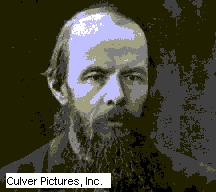
Fyodor Dostoevsky (1821 - 1881)
![]() Albert
Camus. The Plague (1948), The Stranger (1946),
and The Myth of Sisyphus and Other Essays (1955).
A visually appealing site designed for the philosophically inclined web-surfer.
It includes a well written overview of existentialism and that movement's
major players.
Albert
Camus. The Plague (1948), The Stranger (1946),
and The Myth of Sisyphus and Other Essays (1955).
A visually appealing site designed for the philosophically inclined web-surfer.
It includes a well written overview of existentialism and that movement's
major players.
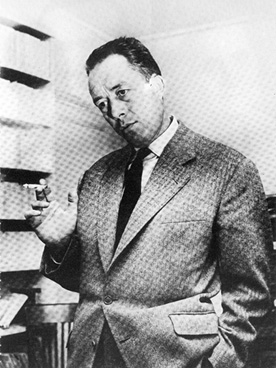
Camus (Courtesy of Lennart Green)
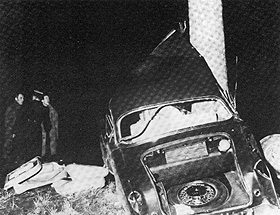
The car in which Camus was killed.
(Paris-Match/Lefebvre)
Click the above image and you will be expedited
to a free daily "paper" that combs the Web
for engaging and critical articles examining
issues such as politics, literature, the fine
arts,
cultural theory, and current affairs.